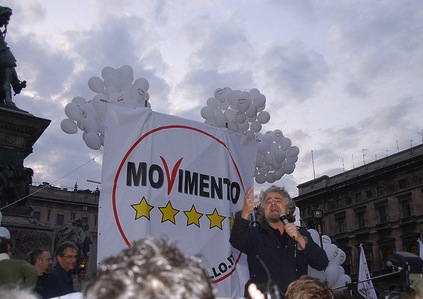Comedian Rick Mercer talks politics with more vigour and zip than any other public voice in English Canada. Rick’s Rant on the Harper government’s campaign to mute and throttle science stands out only as the most recent example.
Imagine Rick teaming up with a social media guru, and forming a political party that walked away with one voter in four in its first national election try?
This improbable scenario just occurred in Italy. In the February general elections, stand-up comic Beppe Grillo led his Movimento 5 Stelle (Five Star Movement, or M5S) to a narrow win over the centre-left Democratic Party led by Pierluigi Bersani, and the right-wing People of Freedom (PDL) led by the infamous Silvio Berlusconi.
How good were 5 Stelle results? According to political scientists Giuliano Bobba and Duncan McDonnell, no new party in the history of Western Europe has ever done so well in its first outing. Every one of the 108 candidates the M5S elected to the Chamber of Deputies and the 54 new Senators will be taking a seat for the first time.
M5S ran an improbable campaign. Grillo grew his support using meet-ups, union-style organizing, public rallies, Twitter, Facebook, and his blog where, alternatively, he skewered his opponents, and set out his vision: “The ambition is to promote a new way of thinking, a new civic awareness that is able to take back the country.”
M5S (co-founded by Internet entrepreneur Roberto Casaleggio) lists its headquarters as Grillo’s blog, where you can read the “non-statutes” of his party, the electoral program, and various campaign pronouncements.
Grillo refused to appear on television because he said the networks were complicit with state and party corruption. He ruled himself out as an election candidate because of his 1980 conviction for criminal negligence following a fatal crash that killed three people riding in his car. Nonetheless much of the 5 Stelle appeal is credited to the extraordinary charismatic figure that is Beppe Grillo; in translation, his name becomes Joe Cricket, and his followers, inevitably, the little crickets (Grillini).
Now in his 60s, Grillo developed a wide following in the 1970s doing TV monologues and sketches, until in 1987 he jabbed at then prime minister Craxi, a socialist, accusing him of corruption, and he was dropped by the networks. Later Craxi had to flee Italy for Tunisia to escape prosecution … for corruption.
Already wealthy, Grillo did not make it back on television. But in recent years, his blog has become the most widely read in Italy, and his smart, tough commentary widely quoted. Grillo calls Bersani “a political stalker” and a “dead man talking.” The outgoing prime minister Mario Monti is “Rigor Monti.” Taking hard shots is his style, and his online followers were prepared to follow him into party politics.
The Movimento profits from a widespread democratic malaise surrounding established political parties. In Italy, and elsewhere, “parties have moved from representing interests of the citizens to the state to representing interests of the state to the citizens,” as the late political scientist Peter Mair put it.
M5S gained followers, organizers and eventually voters, in reaction to austerity, cuts to pensions, social spending chops, and job losses. The influential German Spiegel Online talked about an Italian “uprising,” and reported an M5S supporter saying German Chancellor Angela Merkel was a target.
The outgoing coalition headed by Mario Monti defended the “responsible” agenda, designed to soothe bond markets, and reduce the gap between what Italy pays for its debt, and what Germany pays. The centre-left Democratic Party abandoned its social democratic stance to advocate for the responsible option.
Grillo is a Euro skeptic. He has called for a referendum, asking: Should Italy remain in the Euro? His success mirrors that of other opposition parties in Europe, where governments fall from grace in succeeding elections, as Bobba and McDonnell point out. They list M5S concerns: “anti-corruption laws, political system reform, the environment, universal unemployment benefit, local referendums on large public works” and remark these are widely held in Italy.
While Grillo sometimes sounds like the leader of one of the upstart “Pirate parties” advocating for free bandwidth, and ending telecom monopolies, he was an accountant before his success as a comedian, and his analysis of corporate finance and political dealings has won him respect. M5S represents a reaction to the excesses of La Casta, the Italian (and European) political elite with their high salaries, generous pensions, inflated expense accounts, and corrupt practices.
The President of Italy is an 87-year-old former communist who steps down in April. His job is to identify the next government. The centre-left coalition controls the Chamber, but not the Senate where Grillo has the balance of power. A new coalition must control both the Chamber and the Senate to govern effectively. M5S has refused to enter a coalition, but could be open to supporting specific measures.
It is expected the Vatican conclave will elect a new Pope, before Italy gets a prime minister, a government, and a new president.
The election of February 2013 will be remembered for Grillo shouting at those in power: “Give yourselves up! You are surrounded by the people of Italy. Come out with your hands up! No one will touch you. Your time is up.” Little doubt Rick Mercer would have enjoyed it.
Duncan Cameron is the president of rabble.ca and writes a weekly column on politics and current affairs.
Photo: Claudio Manent/Flickr




